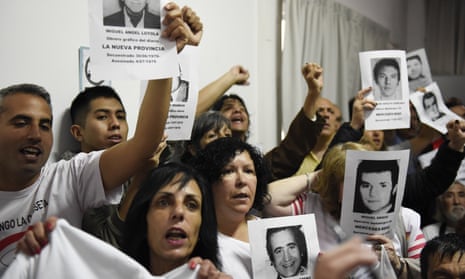Two former executives of a local Ford Motor Co plant have been convicted for human rights crimes over the abduction and torture of company workers during Argentina’s 1976-83 dictatorship in a historic judgment.
Although nearly 1,000 former military officers have been imprisoned over crimes committed under military rule, Tuesday’s verdict in a Buenos Aires court marked the first time executives of a foreign company have been convicted.
Former Ford executive Pedro Müller, 86, and Héctor Sibila, 90, a former Ford security manager, were sentenced to 10 and 12 years, respectively, for the kidnapping and torture of 24 employees at Ford’s General Pacheco plant outside Argentina’s capital city.
Testimony at the trial showed the executives provided the military with lists, addresses and photo IDs of workers they wanted arrested and even provided space for an illegal detention centre at the plant where the abductees could be interrogated.
“The company acted in a coordinated manner with the military,” the prosecution alleged.
Former army general Santiago Riveros, who oversaw repression in the General Pacheco area, was convicted to 15 years for the same crimes committed at the Ford plant. All three will benefit from house arrest because of their advanced age.
“Ford is an example of civilian-military state terrorism operations,” tweeted Hijos Capital, an association representing the children of the disappeared of the capital city of Buenos Aires.
The trial got under way last December in a tribunal packed with former employees of the General Pacheco plant. Prosecutors alleged that the plant was used as a clandestine detention centre.
“The majority were kidnapped right off the assembly line,” said Tomás Ojea Quintana, a lawyer for the plaintiffs at the start of the trial. “They were taken by rifle-toting military officers and paraded before the other workers so they could see what happened to their union representatives. This created an atmosphere of terror in the workplace that prevented any wage or working condition complaints.”
The kidnapped employees were immediately fired by the company, sometimes while they were still being tortured on the plant’s premises, according to testimony.
Former employee Carlos Propato recalled at the trial how he was tortured for 11 hours at the plant. All 24 were then sent to a police station or to Buenos Aires provincial jails, where they remained under illegal arrest for periods ranging from several months to two years.
Charges for the Ford plant crimes were first brought before a court in 1984 after the return of democracy to Argentina. But these trials were stopped by the sweeping amnesty laws voted by Congress in 1986 and 1987, which were overturned by Congress in 2003.
A supreme court ruling in 2005 upholding the congressional vote finally opened the way in 2006 for the lengthy series of trials that made possible Tuesday’s historic conviction of former foreign company executives.
The plaintiffs may still try to sue Ford in US federal courts, one of their lawyers told Reuters.
Ford Argentina said in a statement it was not part of the case and had participated fully with local prosecutors. Ford officials in the US could not immediately be reached for comment.
Quintana said the plaintiffs were now considering suing Ford Motor Co in the US.
“It is clear that Ford Motor Company had control of the Argentinian subsidiary during the 70s. Therefore, there is a direct responsibility of Ford Motor Company and that might give us the possibility to bring the case to the US courts,” he told Reuters.
Nearly 3,000 people have been charged with human rights crimes and close to a thousand have been convicted so far, but convictions of civilians allied with the military remain scarce, usually involving only former civilian officials of the dictatorship.
